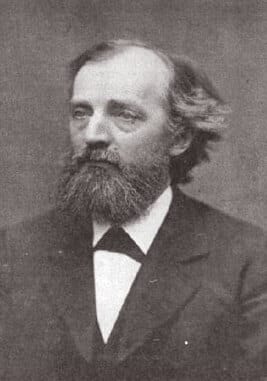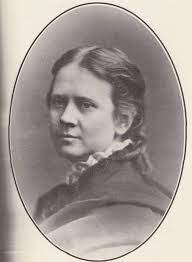Angela Tilton Heywood and Ezra Heywood were 19th-century editors, publishers and writers who founded the free love journal The Word. Ezra was prosecuted under the anti-obscenity federal Comstock Act for sending writings deemed to be obscene, some of them by his wife Angela.
Ezra had attended Brown University in Rhode Island and entered its divinity school with hopes of becoming a Congregational minister. He left to become a traveling lecturer for a Massachusetts anti-slavery society and met Angela through the abolitionist movement. They settled in Princeton, Massachusetts, in Worcester County.
Heywoods published articles on women, sex education of children
In May 1872, they launched The Word, which was pro-labor, anti-capitalist and pro-women’s rights. They defined free love as bonds based on love and affection and though they themselves were monogamous, they also supported “varietists.”
Angela contributed dozens of articles on topics like plain language, women’s labor rights and the sexual education of children. They had four children: Vesta, Hermes, Psyche, and Angelo. Based on the spacing of their children, they likely used a contraceptive technique called male continence, in which the man orgasms without ejaculating.
In 1873 they published Uncivil Liberty, which called for political enfranchisement of women. They lectured throughout Massachusetts on love and marriage, and she spoke in plain English about sexuality.
Heywoods treatise criticized Comstock as 'religious mono-maniac'
Both despised Anthony Comstock, who had pushed Congress to pass the Comstock law in Washington only a year after they launched The Word, and they took aim at him often in their paper. Their 1876 treatise Cupid’s Yokes called Comstock “a religious mono-maniac” and supported women’s rights and male continence. When they were typesetting Cupid’s Yokes, Ezra remarked to Angela, “Either Comstockism or this book will go under.”
In 1877 Ezra received a fan letter from a New Jersey reader calling himself “E. Edgewell” who requested a copy of Cupid’s Yokes and a medical book called Sexual Physiology that the Heywoods sold on commission. A few months after Ezra sent off the books, he and Angela went to preside at a New England Free Love League convention in Boston. While they were in Boston’s Nassau Hall, speaking to an audience of free lovers, Comstock arrived at their home to try to arrest them.
After Angela’s sister told Comstock where they were (likely without knowing who he was), he traveled to Boston and entered the hall, where 250 people were gathered. He heard Ezra railing at “that Comstock.” Angela spoke about “generative sexual intercourse” and used the word penis. Comstock described it as “the foulest address I ever heard.”
Ezra Heywood put on trial for mailing treatise and book on sex

Ezra Heywood
Ezra was arrested and taken to Charles Street Jail, the Boston prison that would one day house Italian anarchists Sacco and Vanzetti. Radicals circulated a petition to overturn the Comstock law.
The trial, for mailing Cupid’s Yokes and Sexual Physiology, opened in 1878. There were no passages named in the indictment, only the book titles. Questioned by Heywood lawyer J.P. Pickering, Comstock acknowledged sending the Edgewell letter himself after the Princeton post office alerted him that Cupid’s Yokes was obscene.
In his closing argument, Pickering said the books were useful and moral, and that the government had not proved Heywood had mailed them himself. The district attorney said free love was dangerous to children, and read excerpts from Cupid’s Yokes. At the time, the definition of obscenity was anything that excited impure or lewd thoughts, was immoral or incited impure desires. The jurymen found that Sexual Physiology was not obscene, but Cupid’s Yokes was.
Supreme Court ruled mail can't be searched without warrant
Heywood’s lawyers filed appeals but the judge postponed them. The Supreme Court was hearing a similar case, Ex parte Jackson, which challenged the constitutionality of the Comstock law on free speech grounds.
Ex parte Jackson found that sealed mail could not be searched without a warrant but it also upheld the constitutionality of the law — a victory for Comstock. Ezra was imprisoned in Dedham Jail. While he was in prison, he invented a new calendar system in which 1873, when the New England Free Love League was founded, became Y.L. 1, or Year of Love 1, and so on.
After six months, he was pardoned by President Rutherford B. Hayes.
Heywoods continue to publish writings, Ezra sentenced to prison
A few years after his release, a New York woman doctor was arrested for selling a vaginal douching syringe, which could be used as a contraceptive, to an undercover Comstock assistant. In protest, the Heywoods advertised a “Comstock syringe” in The Word. If Comstock’s mother had used a contraceptive syringe, they wrote, “what a world of woe it would have saved us!”
Ezra was arrested three more times on charges that included Angela’s writing and the Comstock syringe ads. In one indicted essay, Angela envisioned a world in which a man could only “flow semen” when a woman said he could and had to keep his sex organ tied up with “continent” twine. If he were found untwined he could be convicted by a jury of twelve women.
Ezra was acquitted, but in 1890, sentenced to two years of hard labor in Charlestown State Prison. Angela managed The Word while he was in prison. A year after his release, he died of an illness most likely contracted in prison. In 1908, their home caught fire and burned to the ground—with all their papers inside. Angela died in Brookline, Massachusetts, at 94, having outlived him by more than four decades.
Amy Sohn is the award-winning author of The Man Who Hated Women: Sex, Censorship, & Civil Liberties in the Gilded Age.

